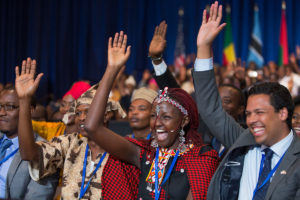
The H3Africa Consortium
The Human Health and Heredity (H3Africa) Consortium fosters genomic research on the African continent, by supporting infrastructural development, capacity building and research. It is comprised of 48 funded projects with 11 focusing on exploring pertinent ethical issues including issues around informed consent, community engagement, stigma and return of individual genetic research results.
Concerns about genomics research in Africa
When H3Africa first got funded in 2012, genomics was new to most of the institutions and countries in which research was to take place. At the time, only few medical genomics research projects had involved African participants, with projects like MalariaGEN, HapMap and 1000Genomes as notable exceptions. In particular, the proposed storage and sharing of large amounts of African DNA samples and data – integral to genomic science and increasingly common in medical research – raised considerable concerns by African regulators and scientists. Amongst a range of concerns, what stood out most clearly were concerns about exploitation and harm.
Concerns around exploitation were articulated mostly with regard to questions about the role that African researchers would play in H3Africa research. The worry was that they would simply be sample collectors and would not be empowered to lead study design, data analysis and write-up. On the issue of harm, concerns were raised about whether and how African research participants – who may have low research and health literacy – could be harmed by the research, for instance through an increase in stigma or reputational harm.
With a goal of clinical application of findings from genomics research in mind, which usually takes a while and would require further studies on the samples and data collected from H3Africa projects, a more general concern arises of when, if ever, research participant communities and the health systems would benefit from such genomics studies.

Engagement matters
The concerns raised by regulators and researchers from Africa are germane. The inclusion of African samples in genomics studies is likely to improve the robustness of any genomics findings. Generally, with implications specific for African populations. Thus, promoting genomics research in Africa is of value to both the global scientific community and African populations with the presence of mechanisms needed so as to address the concerns raised by African researchers and regulators being paramount.
Against this background, the H3Africa Working Group on Ethics and Community Engagement – which all three authors have chaired previously – recognized the importance of having a platform to foster a substantive discussion about the ethics of African genomics research on the continent. This discussion would not only need to be premised on conceptual analysis, empirical data and guideline development but also importantly would need to engage individuals who are involved in research ethics regulation around the continent. In other words – we recognized that in order to fuel a substantive African engagement with the ethics of genomics research, we needed to engage the community of research ethics regulators.
As an initial response to this need, H3Africa supported a series of broad consultations with members of research ethics committees, national ethics councils and policy makers from across the continent. Over the course of three years, we held consultations that progressively involved close to 200 of these stakeholders. From these consultations, there was consensus that there is a critical need for a document that puts forward a set of principles that resonates with African communitarian world view and provides guidance on ways to look at and address some of the concerns of exploitation and harm, when considering the desirability of proposed genomics research. Thus, our engagement informed the development of the “Ethics and Governance Framework for Best Practice in Genomic Research and Biobanking in Africa”. This document was developed in collaboration with a community of ethics regulators and has been lauded as a welcome development for genomics research in Africa. We also designed training on genomics research for research ethics committee members, guidance documents on community engagement and informed consent in genomics research. These are tools which would help African researchers and regulators engage in meaningful negotiation with collaborators and sponsors to, as much as possible, assuage any potential for exploitation or harm.

Our engagements had resulted in tools that help address the immediate concerns of exploitation of African researchers and potential harm to participants. The degree to which these tools are used beyond H3Africa projects is not known. With emerging ethical concerns, such as those to do with return of individual findings of genomics research and use of results for commercial purposes, insights from African researchers, regulators and potential participants remains invaluable.
Emerging from its ongoing 14th meeting in Accra Ghana, the H3Africa Consortium is keen to support the implementation of more consultations to debate ethical issues in genomics research in Africa and develop tools to help address them. For sustainability, there is the need for African governance institutions to also progressively support these initiatives. Institutions like the African Academy of Sciences are already stepping up, however something more substantive from the African Union would be ideal.
Comments